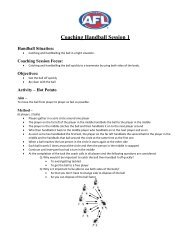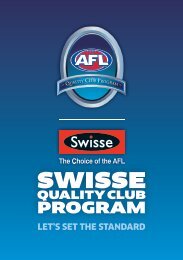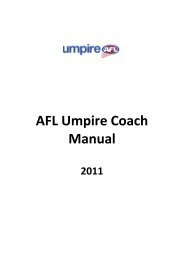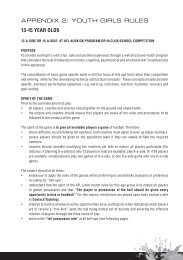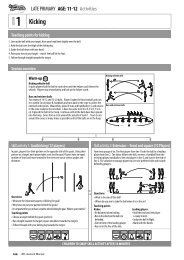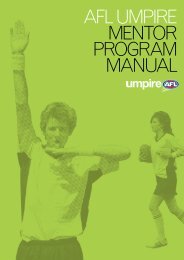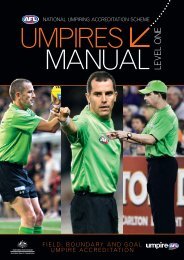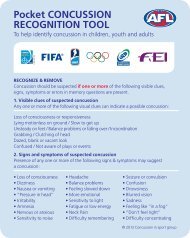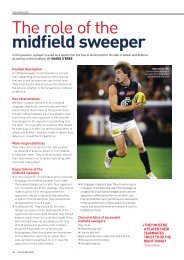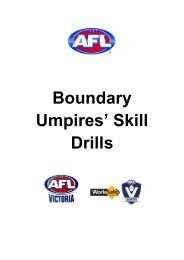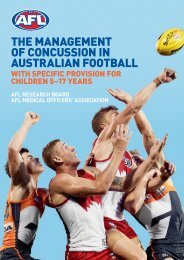2012 Youth Coaching Manual - AFL Community
2012 Youth Coaching Manual - AFL Community
2012 Youth Coaching Manual - AFL Community
Create successful ePaper yourself
Turn your PDF publications into a flip-book with our unique Google optimized e-Paper software.
Chapter 6<br />
Planning<br />
Introduction<br />
There are many factors that are important for effective coaching. However, if there is any one area that is perhaps more<br />
important than the others, it is the area of planning.<br />
The yearly/season plan<br />
A yearly plan is an essential component of effective coaching for players intending to optimise their development. Players<br />
involved in the lower levels of sport often achieve some success without a yearly plan, but few will reach their full potential<br />
and go on to become high-level players unless they have a structured training and competition plan. School, club, zone, state<br />
and national programs should all be linked together, and through optimal calendar planning should ensure a progressive<br />
structure and sequence of training and competition.<br />
The yearly plan helps players maintain a balanced lifestyle, prompts the coach to organise facilities, equipment and<br />
transport well in advance, enables parents and schools to cater for the needs of the participant (and allows the players to<br />
organise training and competition around school requirements) and provides an objective measure which coaches can use to<br />
assess the effectiveness of their program.<br />
Yearly plans vary between sports, players and cultures. Many factors affect the composition of such plans, including:<br />
• Family and school commitments.<br />
• Characteristics of competitions.<br />
• Level of maturity and ability.<br />
• Resources.<br />
• Climate.<br />
• Attitudes.<br />
• Demands of the sport.<br />
• <strong>Coaching</strong> events.<br />
• Time of day.<br />
• Access to athletes<br />
Phases of a yearly plan<br />
In order to be successful, the coach must be well prepared and plan ahead. The importance of planning cannot be<br />
underestimated. A major reason for having a yearly plan is to schedule the various phases throughout the year in order to<br />
bring about optimal performance so that the playing group is at the peak of its training at the time of competition. A team’s<br />
training schedule should be organised and planned to also ensure individual and group goals are achieved. The planning<br />
process therefore should be an organised, methodical and scientific procedure which assists the players and coach achieve<br />
predetermined standards.<br />
A yearly training program should be simple and flexible. All coaches should have a yearly plan dividing the training<br />
year into small phases. Each of these phases will have specific training objectives. This enables the coach to work within<br />
manageable segments.<br />
A yearly plan can be divided into three phases:<br />
• Off-season or transition phase.<br />
• Pre-season or preparatory phase.<br />
• In-season or competition phase.<br />
<strong>AFL</strong> <strong>Youth</strong> <strong>Coaching</strong> <strong>Manual</strong><br />
59



